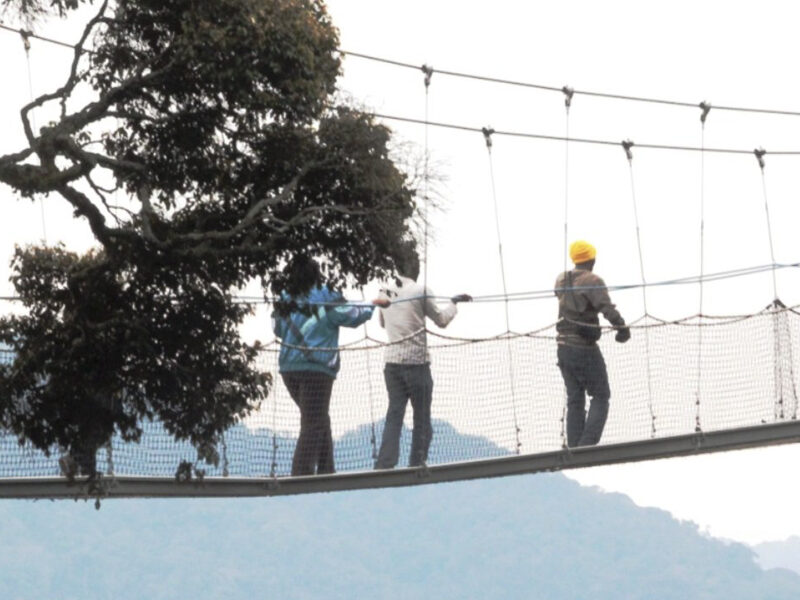8 Days Mount Elgon Climbing Tour
3000$
per personOn this tour, climb Mt Elgon, and en route visit Jinja and Source of the River Nile, detour to Mabira Forest Eco Tourism site, visit Itanda Falls the other end of the Nile. Except for a few variations, Climbing equipment and food is the same as that for climbing the Rwenzori Mountains.
Mount Elgon came into existence as a result of a volcanic eruption. For hundreds of years, the mountain has never erupted since its formation. With its highest peak, Wagagai, at 4,321m high, Mount Elgon’s major features are: plethora of waterfalls, hot springs and the extraordinary caldera, which is about 8 kilometres in diameter. Although Uganda is at the Equator, Mount Elgon sometimes experiences temperatures below freezing point. The blazing equatorial sun and freezing temperatures produces giant vegetation. Climbing is best done in the dry months of June to August, and December to February, but other months are also manageable.
-
DepartureTour startTour starts from and Ends in Entebbe
-
Departure TimePlease arrive by 9:15 AM for a prompt departure at 9:30 AM.
-
Return TimeApproximately 8:30 PM.
-
Dress CodeCasual. Comfortable athletic clothing, hiking shoes, hat, light jacket.
-
Include
Day 1: Arrival
Day 2: To Mt Elgon
Day 3: To Piswa Patrol Camp (2850m)
Day 4: To Hunters Cave (3870m)
Day 5: To Mude Cave Camp (3500m)
Day 6: To Sasa River Camp (2900m)
Day 7: To Budadiri Ranger Station (1250m)
Day 8: To Kampala and out
Tour Location
For all categories of accommodation, ALL drinks (except bottled water in vehicle) are excluded in the safari cost and clients are to pay for them direct to the hotels/Camps / Lodges.
- Tanzania has a long history, with evidence of human settlement dating back millions of years.
- The Ngorongoro Conservation Area is considered the "Cradle of Humankind" due to the discovery of early human remains and tools at Olduvai Gorge.
- Various groups, including the Hadza and Sandawe hunter-gatherers, Khoisan-speaking people, Southern Cushitic speakers, and Bantu-speaking peoples, contributed to the region's early history.
- The Bantu expansion played a significant role, bringing ironworking and social organization.
- The region was also influenced by trading contacts between Arabia and the East African coast, leading to settlements of Asian and Arab traders.
- The mainland was declared a protectorate of German East Africa in 1886.
- Zanzibar was a British protectorate.
- After World War I, the region became a League of Nations mandate under British administration, renamed Tanganyika.
- Tanganyika achieved independence in 1961, and Zanzibar gained independence in 1963, with the subsequent revolution leading to the People's Republic of Zanzibar.
- The unification of Tanganyika and Zanzibar in 1964 formed the United Republic of Tanzania.
- Julius Nyerere, the first president of Tanzania, played a key role in the country's unification and early development.
- Tanzania has faced political and economic challenges since independence, but has also achieved notable progress in areas like conservation and tourism.
Write a Review
For all categories of accommodation, ALL drinks (except bottled water in vehicle) are excluded in the safari cost and clients are to pay for them direct to the hotels/Camps / Lodges. Clients could choose to fly out the following day in cases where there are no flights for their departure on the last day of the itinerary. A supplement for the extra night will be required. Notes to the scheduled tours:
- All extras are non discounted, non commissionable as they are direct rates, such as chimpanzee fees, gorilla permit fees and such extras
- Nonetheless, the 3-day extension to source of the nile: jinja, uganda with option of rafting (Tour No. 5), all rates therein, including all of the extras, are commissionable to tour operators and travel agents.
- Recommendations: In the high seasons (Jan-Feb, June-Sep, Dec-Jan) tours it is recommended that you book well in advance, 6 months in advance and latest time of booking should not go lower than 45 days to arrival; while in the low seasons (March, April, May, Oct, Nov), tours may be booked up to 21 days to arrival.
- We have suggested higher level (mostly 4 star) properties in the itineraries. Where you wish to stay in platinum or top of the range properties, please contact us for supplements.
- Boma Guest House in Entebbe or to Hotel Africana or Bougainviller Hotel in Kampala
- Mbale Resort Hotel or Sipi Falls Rest Camp
- Mountain Camps





